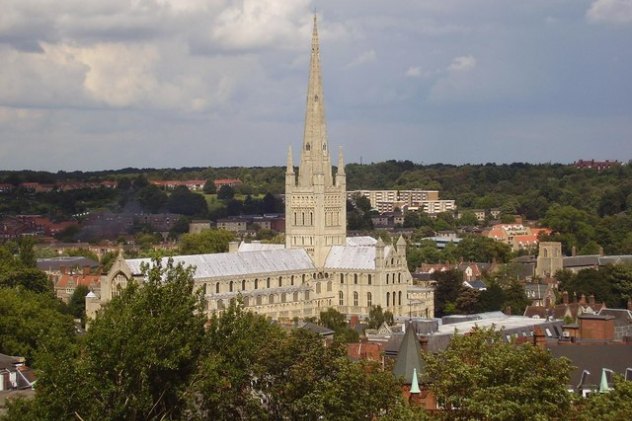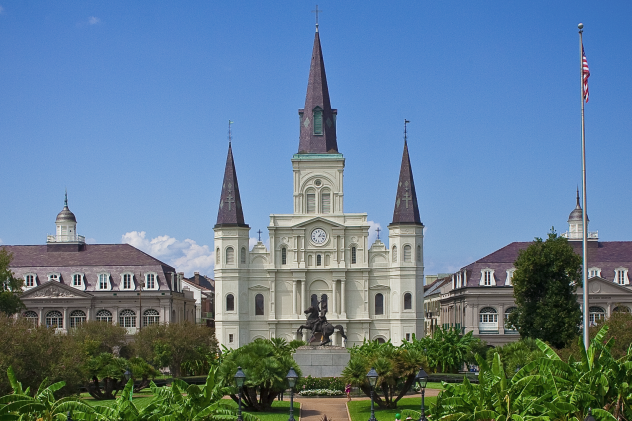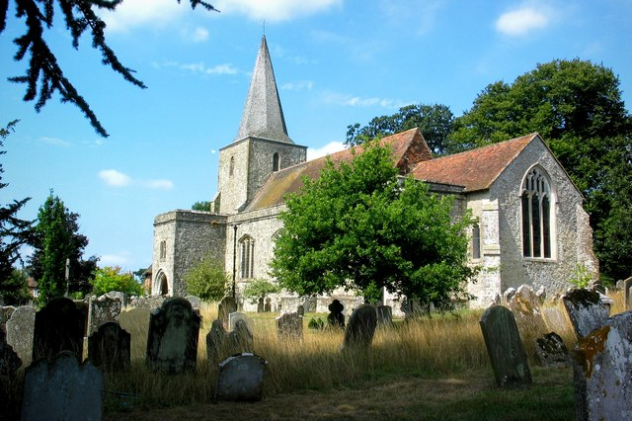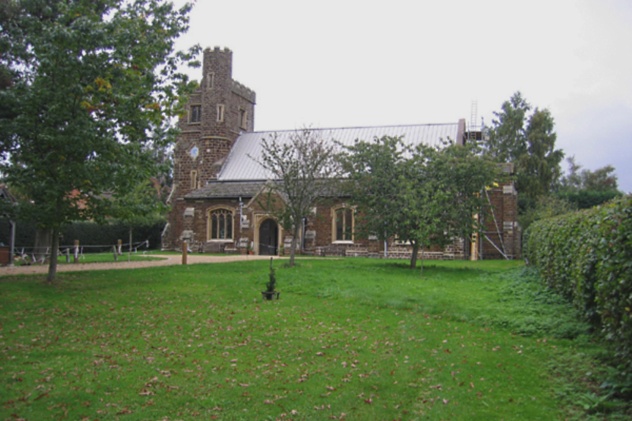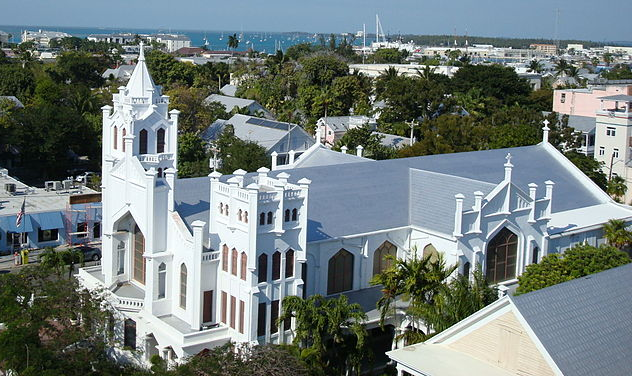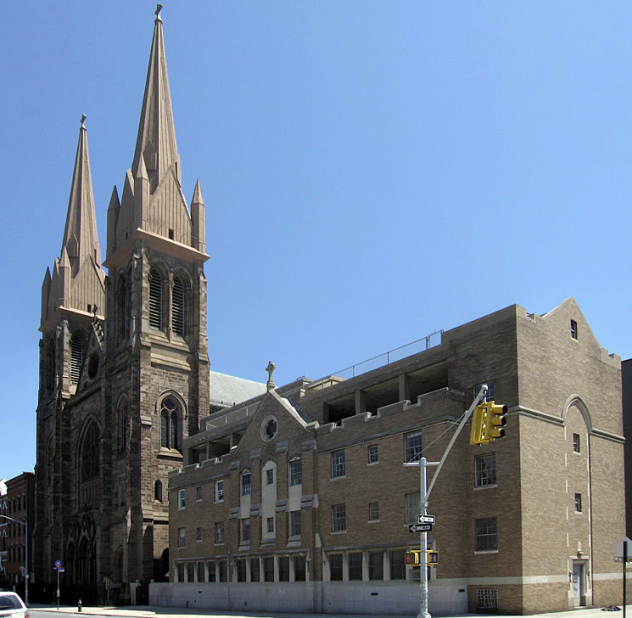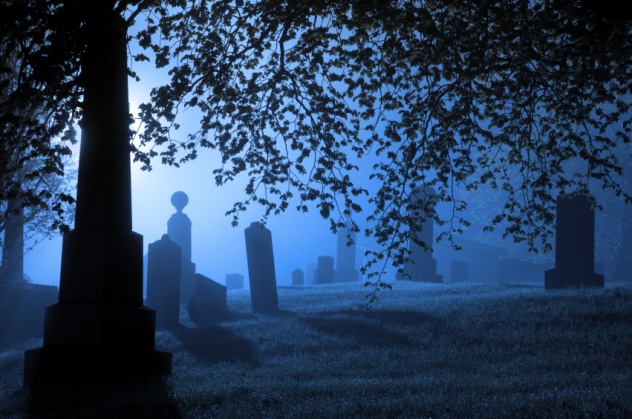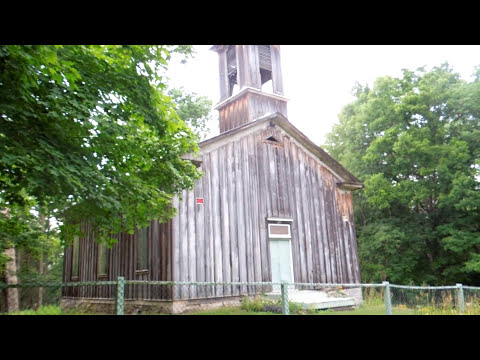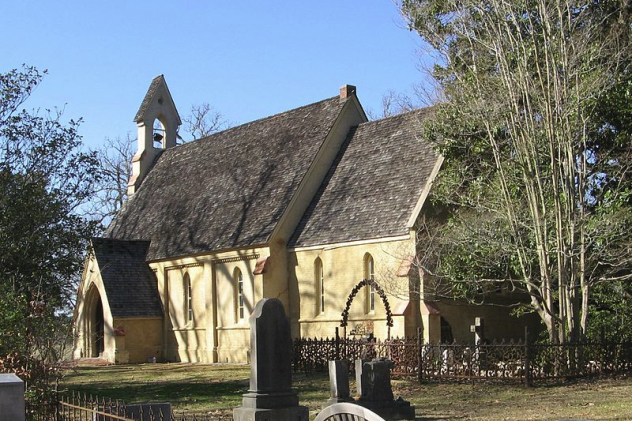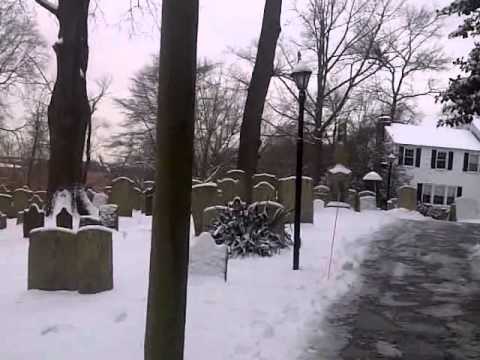10 Norwich Cathedral
Located in Norwich, England, the Norwich Cathedral was first built in 1096, 30 years after the pivotal Battle of Hastings. The formerly Catholic (now Anglican) cathedral is well-known as a beautiful example of Anglo-Saxon architecture. Ironically, in order to build the cathedral, Norman architects destroyed several Saxon buildings (later found to be places of worship) in order to lay the cathedral’s foundations. Contemporary visitors to the cathedral may not know its history, but they almost certainly know about its ghosts. Specifically, tourist Kerry Launders snapped a photo in 2015 that may or may not show the spectral figure of a medieval bishop. The photo was widely covered in both British and US tabloids. Launders believes that she managed to capture the apparition of one of the cathedral’s many eternal residents. Though he’s by far the most famous sighting of paranormal activity at the cathedral, the bishop is not the only spooky figure haunting the cathedral. Its believed that the ghosts of executed Lollards, many of whom were burned at the stake due to their heterodox religious beliefs, patrol the cathedral grounds because the chalk pits that they once used became part of the cathedral itself.
9 St. Louis Cathedral
Like the city it serves, the St. Louis Cathedral in New Orleans is a font of strange myths and legends. Originally built by the city’s French rulers, the modern cathedral wasn’t completed until the 1850s. According to lore, the ghosts of the old structure came along for the ride. One of the cathedral’s better-known ghosts, Pere Dagobert, was an 18th-century priest. Dagobert was renowned for his kindness, especially his willingness to treat the poor and terminally ill. During the 1760s, several members of his congregation decided to revolt against the city’s new Spanish rulers. The mainly French and Creole rebels successfully pushed the initial Spanish force out of the city, but a larger force later managed to claim New Orleans for the Spanish king. Infuriated by the earlier rebellion, Irish-Spanish governor Alejandro O’Reilly decided to not only execute the rebels, but also leave their rotting bodies on the doorstep of the St. Louis Cathedral. As a devout Catholic, Dagobert could not stand by while Catholic bodies were so roughly treated. After failing to get O’Reilly’s permission to properly bury the bodies, Dagobert led a funeral procession down to St. Peter’s Cemetery and placed the slain men in unmarked graves. Dagobert’s successor, a Spanish priest named Pere Antoine, is also said to haunt the cathedral. More intriguingly, Antoine’s friend, voodoo priestess Marie Laveau, who often prayed at the church during her lifetime, is also considered to be one of the many spirits inside the cathedral.
8 St. Nicholas Church
St. Nicholas Church is practically haunted by default. That’s because the village of Pluckley, its home, is reputedly the most haunted locale in all of England. The Kent village is home to the Watercress Woman, who occupies the Pinnock Bridge, and to the ghost of a schoolmaster who committed suicide in front of his pupils. According to a conservative estimate, Pluckley contains no fewer than 12 active spirits. The church itself is said to be the home of both the beautiful ghost of Lady Dering and the Lady in Red, a ghost who searches the adjacent churchyard for her lost baby. The ghost of a former miller who worked in the area is also said to haunt the churchyard in search of a long-lost love. Also, the ghost of a monk at nearby Greystones House is also said to be seen during the night. Finally, visitors to St. Nicholas have reported seeing lights in the church’s windows when nobody was inside.
7 Church Of St. Mary The Virgin
The Church of St. Mary the Virgin, a small parish church in the village of Clophill, Bedfordshire, may be the most infamous house of worship in all of England. Believed to be some 400 years old, St. Mary’s stood abandoned for years until it was renovated in the 1840s. The Victorian-era church initially housed a very small congregation, but few decided to remain once the rumor mills started turning. Word in the area claimed that the church was not built in proper alignment with Jerusalem, thereby deconsecrating the soil. Another rumor held that the new church was built atop a former leper colony. In 1963, the Church of St. Mary the Virgin grabbed headlines across the nation when it was reported that a black mass had been held in the church by local Satanists. Specifically, it was written that the graves of six women were dug up in order to perform necromancy, with one of the skeletons being left behind inside the church itself. Shockingly, the blasphemous acts at Clophill followed a string of strange occurrences in Bedfordshire and Luton. In April 1963, a 12-year-old boy found evidence that several area cows had been decapitated, while a former forestry student admitted to the press that he and a few friends had killed a cockerel and sprinkled its blood inside St. Mary’s in 1961. Following these events, subsequent black magic activity was reported in and around the church. Worshipers abandoned the church in droves. Paranormal investigators continue to study the building in order to locate ghosts and demons. As of today, the church is no longer in service.
6 St. Paul’s Episcopal Church
Founded in the 19th century, St. Paul’s Episcopal Church can be found in the earthly paradise known as Key West, Florida. First built in 1838, the church was destroyed by a hurricane after only eight years of active service. Tragically, this trend would continue, as subsequent hurricanes and floods damaged the church in the 1880s, 1900s, and beyond. Despite this history, most of the church’s ghosts can be found in St. Paul’s Cemetery, not the church itself. Common folklore claims that the church’s most famous ghost is John Fleming, its benefactor. According to reports, Fleming’s ghost is often accompanied by a thin, white vapor. It’s believed that he’s there because his headstone is now part of the church’s walls, which flies in the face of his final request that his grave not be disturbed. More disquieting than an angry ghost is the belief that the church is also haunted by the restless spirits of the churchyard’s former inhabitants. In 1928, a massive hurricane tore through the churchyard and scattered the once-buried bones everywhere. Some of the bones wound up in nearby trees, while still more were left to rot on the ground ahead of a cement paving operation. On top of that, an examination of the ruined graveyard revealed that the site was much older than previously believed. Specifically, the churchyard sat on top of an older Seminole burying ground. Supposedly, their ghosts have joined with the ghosts of Spanish and American settlers in order to haunt the areas surrounding the church grounds.
5 Most Holy Trinity Church
A Brooklyn landmark, the Most Holy Trinity Church may also be the borough’s most haunted site. While the modern structure was completed in the 1880s, the church’s school building was built on top of a former cemetery. Accordingly, it’s widely believed that the spirits that once haunted the cemetery now haunt the school building. In particular, flickering lights, disembodied feet, and strange voices have been reported in the church’s gymnasium. Another ghost is said to come from the church’s belfry. During the time when the church almost exclusively catered to the area’s German Catholic population, a bell ringer named George Stelz was butchered by burglars who left their bloody handprints inside the church. Visitors have claimed to feel uneasy in the church’s vestibule, while others have claimed to hear ghostly bells ringing throughout the church. Besides Stelz, the church’s other famous ghost is a pastor who built the church’s rectory in 1872. The pastor, who died inside the church, is said to still haunt the church’s grounds as a benevolent spirit.
4 St. Andrew’s On The Red
St. Andrew’s on the Red, completed in 1849, is located in the town of Selkirk which is more or less a suburb of Winnipeg. It is the oldest stone church in Western Canada, and it may be the region’s most haunted, thanks to the spirits of former plague victims. Other apparitions are said to populate the church’s graveyard. Eyewitnesses have reported seeing a ghostly man clad in black and a mysterious woman in white. Also, a disembodied pair of red eyes have startled visitors in the past, while a ghost car has been noted not far from the church’s main entrance. If you are thinking about visiting the church or its graveyard, be wary: Those who’ve claimed to have seen the various apparitions also reported having terrible nightmares the following nights. Most of these nightmares apparently involved the gates of the cemetery, which rattle even though no hands are seen shaking them.
3 Egg Hill Church
Pennsylvania’s Egg Hill Church may be home to the ghosts of murder victims. Local legend says that in the late 19th century, the church’s minister decided to kill his entire congregation during a Halloween service. While the congregation’s children played in the rooms below the main church, the minister passed around poisoned bread and wine. While the sickened congregation choked on their last words, their children rushed upstairs to see the final moments of their parents. At the crescendo of the atrocity, the debauched minister hung himself near the altar. Some believe that his ghost haunts the abandoned church, while others believe that the ghosts of his victims haunt it. Unfortunately for amateur ghost hunters, there is absolutely no evidence to support this claim. The story, which refuses to go quietly into the night, has no basis in historical fact. However, that hasn’t stopped alternate versions, such as one in which the minister manually sliced and diced each victim with a knife. Of course, if the origin story isn’t true, then Egg Hill Church must not be haunted. Some paranormal investigators support this claim, while others maintain their distance from the entire legend. Whatever the case, it remains irrefutable that Egg Hill Church is a foreboding structure.
2 Chapel Of The Cross
Like many churches, the Chapel of the Cross in Madison, Mississippi, is located near a cemetery. The picturesque stone structure once belonged to the wealthy and influential Johnstone family. In fact, the church’s current location lies on the former grounds of the family’s estate. There, in the 1850s, Helen Johnstone was set to be married to a respectable young man from a local family. Tragically, Helen’s husband-to-be died in a duel in New Orleans before the wedding. His body was returned to Mississippi and buried in the churchyard. A grief-stricken Helen visited his grave every day until her own death in 1916. Since then, eyewitnesses have claimed that Helen’s ghost can be seen near the old cemetery on certain nights. Other visitors to the moody church have reported hearing bells and noises inside the church during early morning hours. On one occasion, two students from Belhaven College were exploring the grounds during a moonlit night and thought they saw faces in the church’s windows and heard organ music. Other commonly reported sightings involve ghostly children passing through the church’s iron gates before disappearing, as well as the disembodied laughter of a madman.
1 St. Andrew’s Episcopal Church
St. Andrew’s Episcopal Church in Staten Island is yet another Anglican/Episcopalian church that is widely believed to be haunted. A common stomping ground for paranormal investigators, the 18th-century church, which includes an equally frightening cemetery, is said to be home to disembodied voices, chimes, and other noises that cannot be readily explained by rational science. More skeptical minds might cast suspicion upon the church purely because it serves as a haunted house every Halloween. It’s possible that the church is believed to be haunted because it looks scary and people want it to be haunted. That being said, numerous accounts of strange, inexplicable organ music as well as of visitors feeling a sense of dread without probable cause lead many to believe that the old church is in fact haunted by the spirits of former worshipers. Benjamin Welton is a freelance writer based in Boston. His work has appeared in The Weekly Standard, The Atlantic, Listverse, Metal Injection, and others. He currently blogs at literarytrebuchet.blogspot.com. Read More: Twitter Facebook The Trebuchet
